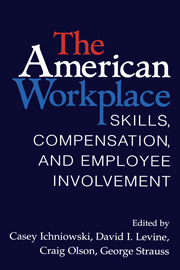Book contents
- Frontmatter
- Contents
- Preface
- List of Contributors
- 1 What Works at Work: Overview and Assessment
- 2 Diffusion and Performance of Modular Production in the U.S. Apparel Industry
- 3 Modular Production: Improving Performance in the Apparel Industry
- 4 The Participatory Bureaucracy: A Structural Explanation for the Effects of Group-Based Employee Participation Programs on Productivity in the Machined Products Sector
- 5 Methodological Issues in Cross-sectional and Panel Estimates of the Link between Human Resource Strategies and Firm Performance
- 6 The Adoption of High-Involvement Work Practices
- 7 The Effects of Total Quality Management on Corporate Performance: An Empirical Investigation
- 8 Implementing Effective Total Quality Management Programs and Financial Performance: A Synthesis of Evidence from Quality Award Winners
- 9 Public Policy Implications
- Index
9 - Public Policy Implications
Published online by Cambridge University Press: 01 February 2010
- Frontmatter
- Contents
- Preface
- List of Contributors
- 1 What Works at Work: Overview and Assessment
- 2 Diffusion and Performance of Modular Production in the U.S. Apparel Industry
- 3 Modular Production: Improving Performance in the Apparel Industry
- 4 The Participatory Bureaucracy: A Structural Explanation for the Effects of Group-Based Employee Participation Programs on Productivity in the Machined Products Sector
- 5 Methodological Issues in Cross-sectional and Panel Estimates of the Link between Human Resource Strategies and Firm Performance
- 6 The Adoption of High-Involvement Work Practices
- 7 The Effects of Total Quality Management on Corporate Performance: An Empirical Investigation
- 8 Implementing Effective Total Quality Management Programs and Financial Performance: A Synthesis of Evidence from Quality Award Winners
- 9 Public Policy Implications
- Index
Summary
The research presented in this volume suggests several implications for public policy. First, policy should support research on what makes workplaces effective. A goal of this research should be to create and validate measures of whether front-line employees solve problems for customers. Such measures would be valuable for investors, top managers, and regulators as well as customers. Second, employers need measures of which employees have skills in problem-solving. Finally, the government should remove legal barriers to new work practices.
The introduction to this volume drew three conclusions from the research literature on effective workplace practices. The first is that innovative human resource management practices can have large, economically important effects on productivity, profitability, and (long-term) stock market value. These positive results do not rely on any single innovation. Instead, they come from a system of related work practices designed to enhance worker participation, decentralization of decisionmaking, and flexibility in the design of work.
The magnitude of the effects suggests that in a well-functioning marketplace, new workplace practices should diffuse rapidly. In fact, the second conclusion is that while most contemporary U.S. businesses have adopted some forms of innovative work practices aimed at enhancing employee participation, only a small percentage have adopted a comprehensive system of innovative work practices.
The contrast between these two conclusions suggests the third: a number of obstacles impede the move to a system of innovative practices.
- Type
- Chapter
- Information
- The American WorkplaceSkills, Pay, and Employment Involvement, pp. 273 - 282Publisher: Cambridge University PressPrint publication year: 2000
- 1
- Cited by



